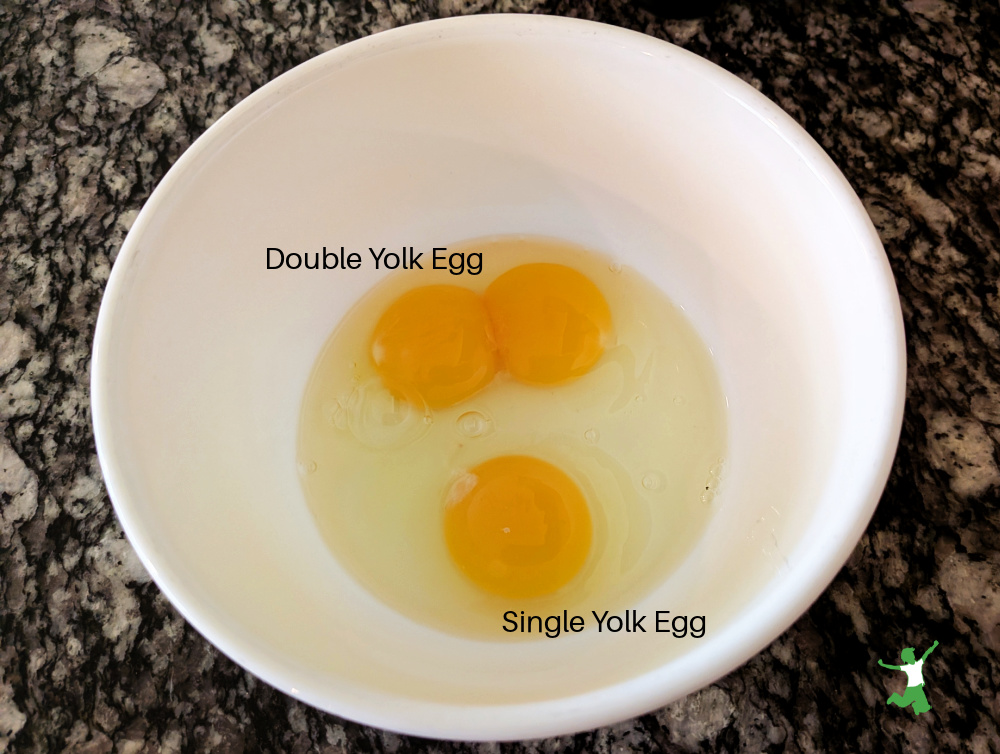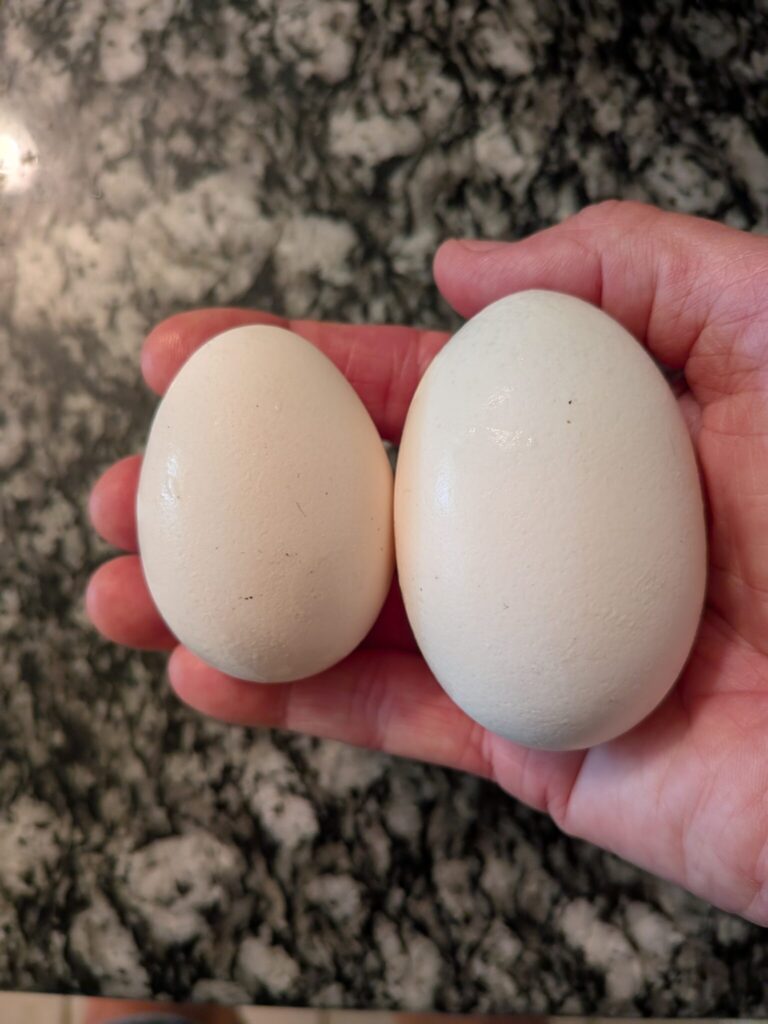The amazing phenomenon of double yolk eggs, how they compare to single yolk store eggs, and tips on getting more of these beauties from your hens!

One of the biggest benefits of keeping backyard chickens is that you get to enjoy eggs that you would rarely (if ever) come across buying organic store eggs.
Eggs you generally don’t see in cartons from the store are what’s called “double yolkers”. They are roughly the size of duck eggs!
Another example is eggs with “meat spots”.
Below is a picture of a double yolk egg that one of my newly laying White Leghorn hens gifted us recently.
Note the size of the double yolker compared to a single yolk egg.
These two eggs were laid by the same young hen!
I really hit the jackpot with this sweet bird ❤️
As you can see from the picture above, each yolk in the double egg is roughly the same size as the yolk in the single egg.
Since the yolk is the most nutritious part of an egg (can you believe some folks still throw them out?), you really do get “two for the price of one”.

While I am fortunate to have a hen that is only six months old laying double yolkers, these beauties typically come from older hens.
This is why you don’t see double yolk eggs in the store from industrialized farms even if organically certified.
Hens from mass production farms are normally culled for meat after only a year or so….as soon as their egg production starts to drop or their first molt, whichever comes first, according to what I’ve been told by those in the industry.
The commercial egg industry also prefers eggs from young hens (under a year and a half old) as this ensures uniformity of size for packing/shipping in egg cartons.
Eggs get larger in size with the age of the hen in my experience. Hence, the propensity for double yolk eggs from older birds.
If you’ve never seen double yolk eggs before, why not?
Are you still supporting the industrial food complex by purchasing eggs at the store?
Note that store eggs, even if organic, may be weeks old (or months old if partially frozen in storage) by the time you buy them. In addition, they are washed with undesirable chemicals as this is required in the United States.
Because eggshells are porous, some of this is no doubt getting into the eggs!
Read more details about the scam of organic store eggs and organic egg washing practices at the provided links.
Contrary to popular belief, a nutritious egg is not all about the yolk color, because this can easily be manipulated with feed to fool the consumer if the hens aren’t truly pastured.
I recommend getting your eggs from one of the sources below to ensure legit yolk color and to avoid the toxic practices that are allowed under USDA Organic for mass production facilities.
- Your own backyard coop (best)
- A neighbor
- Farmer’s market
- Independently owned health food stores that source from local egg farms.
You don’t need any double blind studies to see and taste the difference.
Your five senses will do just fine, thank you!







I buy local farm fresh eggs but when I run out I buy publix greenwise organic cage free and the shell is always very thick. I give my 7 month old an egg yolk every morning and this morning cracked open a double yolk from the greenwise eggs. I had never seen that before but remembered seeing this post. so maybe the publix greenwise eggs are a good back up when you run out of farm fresh eggs?
I would like to know where I can purchase eggs of this type I live in southern Maryland.
I’d never even *heard* of double-yolkers until I had been keeping chickens for more than a year. Then last summer I got a Black Copper Marans pullet and a BCM/Black Marans cross pullet. When they began laying, for awhile all they laid was double-yolkers! Not any more, once they settled into a routine, I guess. I get some from older hens occasionally. I usually keep those for our own use, as they don’t fit in our recycled egg cartons. One of my egg customers did remark during that period that she had one carton that was at least half double-yolkers!
Also forgot to mention… in Mexico they do not refrigerate their eggs…don´t know if this is a good thing or bad, but it´s the way they do it here 🙂
It’s ok to not refrigerate eggs! The only reason most people do it is because they buy them from the store and they are already 6 weeks old! If you get them fresh from the farm, no need to refrigerate.
Hello…. I am from the states, and I live in Mexico. I purchase every week large brown eggs from my farmers market, across the street from my house, … these eggs are double yolk, every one of them, and they are delicious…….
We have our own chickens and we get some double yolks and have gotten a triple yolk- that egg was HUGE.
I must be lucky! I buy eggs from the grocery store (Hickman’s Eggs), and find double yolks regularly. While I would love to purchase farm fresh eggs, t’s not an option at this time.
Sarah, I did and I e-mailed the chapter leader but received no answer. I think it must be outdated.
Silvia, go to westonaprice.org and click on Local Chapters to find the Chapter Leader in your area who can provide you with a local producers list. Bogdan, I will email you my list off board.
Oh, this brings back memories! During my childhood baking days with Grandma we’d often see double or even triple yolks. I hadn’t thought about that in years. 🙂